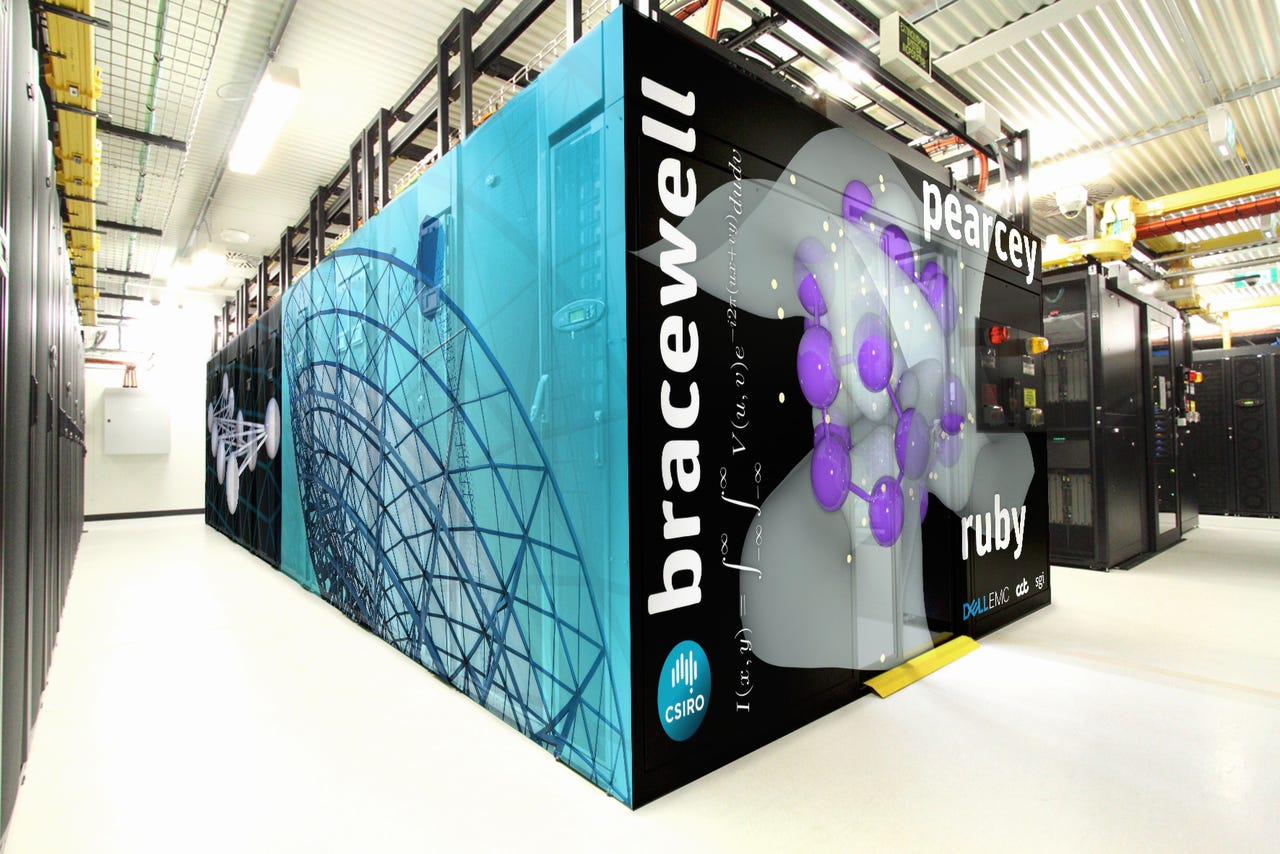CSIRO claims AU$16m-worth of storage space at Canberra Data Centres


CSIRO Bracewell supercomputer housed at Canberra Data Centres
The Commonwealth Scientific and Industrial Research Organisation (CSIRO) has signed with Canberra Data Centres (CDC) for additional space to house its computer systems and associated components.
For a cost of AU$15.8 million, the three-year deal covers "supporting infrastructure for IT services", commonly known within CSIRO as technical floor space -- specialised floor areas used to house and support computer systems and associated components, such as telecommunications, network, security, server, and digital storage systems.
Under the multimillion-dollar contract, CDC will provide fully managed technical floor space for CSIRO's IT infrastructure.
A spokesperson for CSIRO told ZDNet the technical floor space will support CSIRO-owned enterprise IT equipment and services including corporate applications, CSIRO's large scale scientific computing clusters, and research data storage.
CSIRO previously held a contract with CDC that had a term from January 1, 2014 through to December 31, 2017. The new contract is an extension of this.
CSIRO Information Management and Technology provides IT service and support to 5,500 employees and approximately 3,000 affiliates across Australia.
CSIRO currently operates datacentre spaces in a range of locations across Australia, some of which are managed by CSIRO, and some of which are externally managed, depending on organisational requirements, the spokesperson explained.
CDC is home to CSIRO's latest high performance computer, Bracewell.
When commissioned, Bracewell was expected to expand CSIRO's capability in deep learning, further its artificial intelligence progress, and allow for the exploration of virtual screening for therapeutic treatments, traffic and logistics optimisation, modelling of new material structures and compositions, machine learning for image recognition, and pattern analysis.
One of the first research teams to benefit from the new processing power was CSIRO's Data61's Computer Vision group, which develops software for a bionic vision solution that aims to restore sight for those with profound vision loss.
Bracewell will help the research team scale their software to tackle new and more advanced challenges, and give them the ability to use much larger data sets to help train the software to recognise and process more images.
Some of the other work being delivered out of the CSIRO's large scale scientific computing clusters and high performance storage assets, also housed at CDC, include the processing of complex data from the research organisation's radio astronomy installations.
"CSIRO's expertise in handling big data allows us to develop insights and solutions to tackle the biggest challenges Australia is facing -- from modelling climate change and developing innovative health solutions to meeting the needs of a growing domestic space industry," CSIRO chief information officer Brendan Dalton told ZDNet. "We invest in the infrastructure to make science possible."
CDC is 49 percent owned by the Commonwealth Superannuation Corporation, which provides super services and products to Australian government employees and employers.
On Wednesday, CSIRO also announced a partnership with the Swinburne University of Technology in its newly-established office in Silicon Valley, as part of the research organisation's move to increase Australia-US research, innovation, and commercialisation.
"CSIRO has a long history of successful partnerships in the US dating back to helping put the first man on the moon with NASA. With our new Silicon Valley office we're looking to help US organisations make the next big breakthroughs and create a foothold in the US to open the door to innovation for Australian SMEs and universities," CSIRO CEO Dr Larry Marshall said in a statement.
The CSIRO-Swinburne partnership will see Swinburne PhD students and early career researchers, who are co-funded by industry, work on projects with organisations based in Northern California.
PREVIOUS AND RELATED COVERAGE
Microsoft partners with Canberra Data Centres to cash in on government IT spend
Microsoft plans to deliver Microsoft Azure for government use out of two new regions located within Canberra Data Centres in the nation's capital.
CSIRO receives deep learning supercomputer from Dell EMC
With a budget of AU$4 million, Australia's research organisation signed Dell EMC to build its new artificial intelligence-focused scientific computing system, Bracewell.
CSIRO receives new Dell-powered Pearcey supercomputer
The CSIRO has welcomed its new supercomputer to the nation's capital, aimed at helping the organisation further its research in areas such as bioinformatics, fluid dynamics, and materials science.
The world's top 5 supercomputers (TechRepublic)
Have you ever wondered how powerful supercomputers today are? Here are the world's top five, and what they're capable of.
Supercomputers coming soon to an office near you (TechRepublic)
Supercomputers are to ordinary servers as race cars are to street vehicles. Burst processing and cognitive applications are examples of tech that will be in the data centers or desktops of tomorrow.